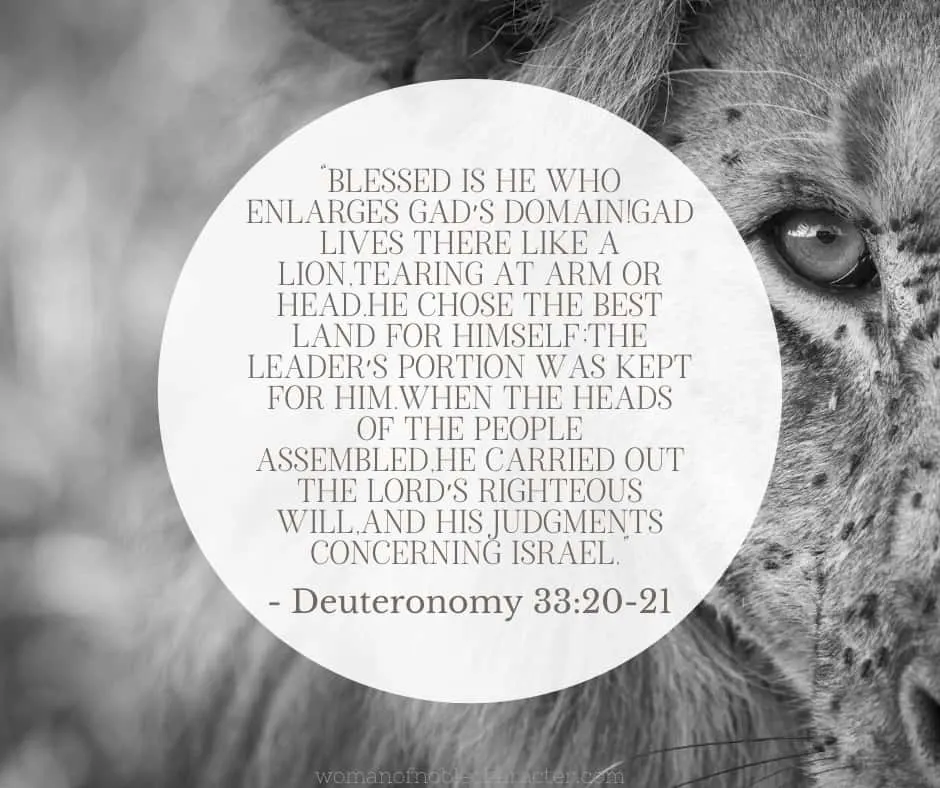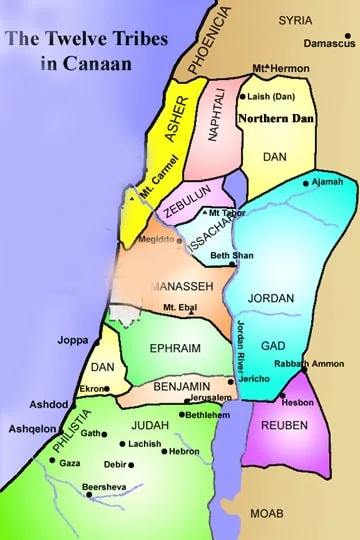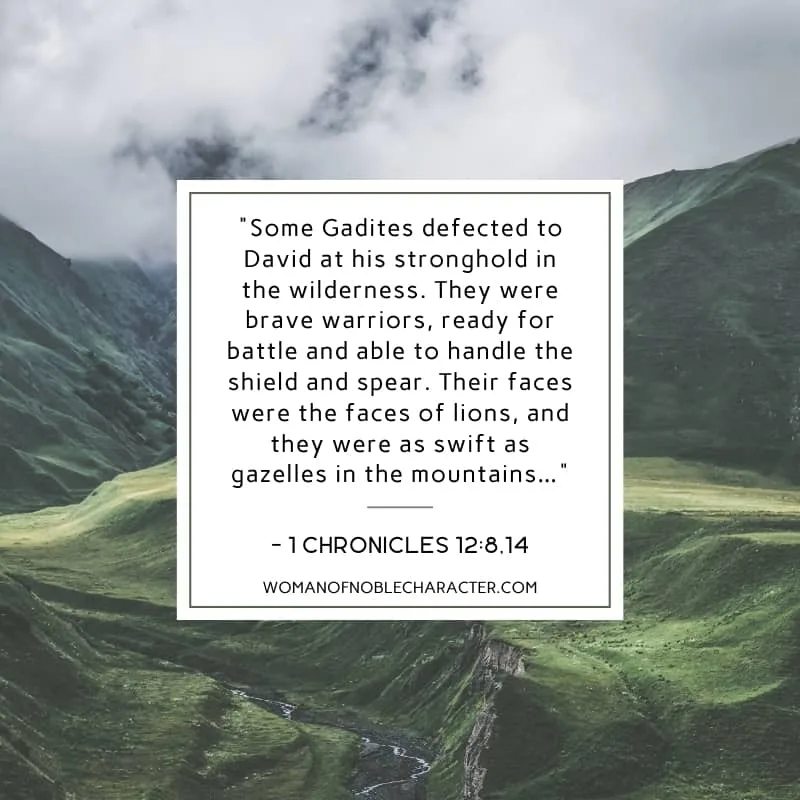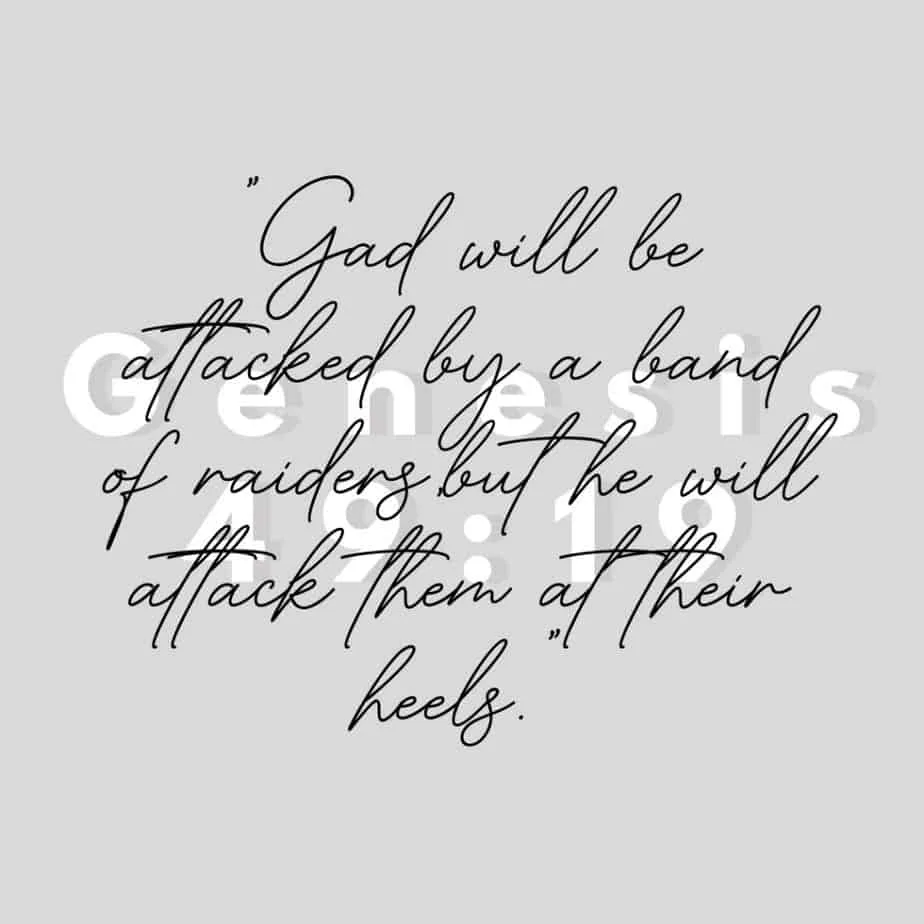This page/post may contain affiliate links. As an Amazon Associate, as well as an affiliate of other programs, this means if you purchase something using these links, I will receive a commission on qualifying purchases at no cost to you! For more detailed information, please visit our Affiliate Disclaimer page
Continuing our series on the Twelve Tribes of Israel, we look this month at the Tribe of Gad. You can find previous tribes here: Simeon, Levi, Judah, Dan, Naphtali, Reuben) Gad was the seventh son of Jacob. His mother was Zilpah, Jacob’s concubine and Leah’s handmaid.
The Name of Gad
Gad’s name comes from the Hebrew word troop. Leah named him Gad, saying “A troop is coming.” Troop, translated from as Gedud and this is what Leah meant when she said Ba Gad-for her sons now made up a whole “troop”.
Then Leah said, “A troop comes!” So she called his name Gad.
Genesis 30:11 (NKJV)

Some translations show that his name means Mazel Tov or “good luck”
And Leah said, “Good fortune has come!” so she called his name Gad.
Genesis 30:11 (ESV)
Who Was Gad in the Bible?
Gad, most famously, was part of the plot to sell Joseph to Egypt and was later sent to Egypt to buy corn during the famine in Canaan, but for this post, we will mainly focus on Gad and his tribe.
The Tribe of Gad Was Known for Being Mighty By the time when Jacob and his family of seventy came to live in Egypt, Gad was the father of seven sons. We’ll learn more about this in a moment. Still, when the Patriarch, Jacob blessed his sons before his death, he prophesied that the tribe of Gad will provide brave troops who will lead the children of Israel to victory in the conquest of the Promised Land, then return to their inheritance on the eastern side of the Jordan.
Even Moses, when he blessed the tribes before his passing, likened Gad to a lion. This was an allusion to the mighty warriors of this tribe who will strike down Israel’s enemies.
And of Gad he said,“Blessed be he who enlarges Gad!
Deuteronomy 33:20-21 (ESV)
Gad crouches like a lion;
he tears off arm and scalp.
He chose the best of the land for himself,
for there a commander’s portion was reserved;
and he came with the heads of the people,
with Israel he executed the justice of the Lord,
and his judgments for Israel.”

It was especially important for the tribe of Gad to be strong, for it received its share of the land on the border and guarded the northeastern portion of the country.
The Tribe of Gad: In the Desert
The Tribe of Gad was large compared to many of the other tribes of Israel. When the Israelites were counted in the census:
The Lord spoke to Moses in the wilderness of Sinai, in the tent of meeting, on the first day of the second month, in the second year after they had come out of the land of Egypt, saying, “Take a census of all the congregation of the people of Israel, by clans, by fathers’ houses, according to the number of names, every male, head by head. From twenty years old and upward, all in Israel who are able to go to war, you and Aaron shall list them, company by company. And there shall be with you a man from each tribe, each man being the head of the house of his fathers.
Numbers 1:1-4 (ESV)
From the descendants of Gad:
Of the people of Gad, their generations, by their clans, by their fathers’ houses, according to the number of the names, from twenty years old and upward, all who were able to go to war.
Numbers 1:24 (ESV)
In the arrangement of the camp and order of the march, the tribe of Gad was placed under the Staff of Reuben, together with Simon, south of the Sanctuary.
“On the south side shall be the standard of the camp of Reuben by their companies, the chief of the people of Reuben being Elizur the son of Shedeur, his company as listed being 46,500. And those to camp next to him shall be the tribe of Simeon, the chief of the people of Simeon being Shelumiel the son of Zurishaddai, his company as listed being 59,300. Then the tribe of Gad, the chief of the people of Gad being Eliasaph the son of Reuel,”
Numbers 2:10-14 (ESV)
Upon the erection and dedication of the Sanctuary, when each of the princes of the tribes brought identical offerings for the dedication of the Altar on successive days, Elyasaf ben Reuel’s (prince of the tribe of Gad) turn was on the sixth day. Among the twelve spies, each representing a tribe, that Moses sent out to spy on the Promised Land, the tribe of Gad was represented by Geuel ben Machi.
from the tribe of Gad, Geuel the son of Machi.
Numbers 13:15 (ESV)
At the second census in the plains of Moab by the Jordan at Jericho, nearly 40 years after the first census, the number of men of military age (twenty and up) of the tribe of Gad fell short of the first count. Their number was now only 40,500.
These are the clans of the sons of Gad as they were listed, 40,500.
Numbers 26:18 (ESV)
After the Eastern area of Canaan was captured from the Amorites (Num. 21:21-3 5), the tribes of Reuben, Gad, and half of Manasseh chose to settle in that area. These tribes had large herds of cattle and sheep, and when they saw that the lands of Jazer and Gilead, east of Jordan, were very suitable for grazing, they approached Moses, Eleazar, and all the princes and requested that this area be given to them as their share of the Promised Land. This seemed, at first, like another rebellion, and Moses sternly rebuked the tribes of Ruben and Gad.
But Moses said to the people of Gad and to the people of Reuben, “Shall your brothers go to the war while you sit here? Why will you discourage the heart of the people of Israel from going over into the land that the Lord has given them? Your fathers did this, when I sent them from Kadesh-barnea to see the land.
Numbers 32:6-8 (ESV)
Moses said, reminding them of what happened to the people when they were swayed by the evil or false reports of the spies. However, the leaders of Reuben and Gad assured him that they were not only willing to accompany the other tribes and help in the conquest of Canaan but would march in the forefront of the battles. Accepting this offer and making it a condition of acceptance, Moses granted their request.
Then the Reubenites and Gadites were permitted to build fortified cities in Transjordan area for the women and children, and sheepfolds for their flocks, while the fighting men of these tribes would cross the Jordan with the other tribes to lead in the conquest of Canaan. The tribes of Gad and Reuben built quite a few of cities, while the clan of Machir, the son of Manasseh, went and conquered the land of Gilead from the Amorites dwelling there, and received it as their inheritance.
You can read the full story in Numbers 32.
The Tribe of Gad Under Joshua and The Territory of Gad
The tribes of Gad and Reuben faithfully carried out their pledge. When most of the land of Canaan had been conquered, Joshua confirmed their inheritance and set the borders of the lands given to these tribes. The Territory of the Tribe of Gad The tribe of Gad settled on land east of the Jordan River, gained renown for its military spirit, and was one of the 10 northern tribes that formed a separate kingdom in 930 BC with Jeroboam I as king. Following the Assyrian conquest of 721 BC, the 10 tribes were partially dispersed and eventually assimilated by other peoples. The tribe of Gad thus became one of the Ten Lost Tribes of Israel.
The tribe of Gad settled on the eastern bank of the Jordan River in the Gilead region and agreed to join the other tribes in the war against the Philistines.

Before the fighting tribes of Reuben and Gad, and the half-tribe of Manasseh returned to their wives and children, Joshua pleaded with them to remain faithful to God with all their hearts and soul. Then Joshua blessed them and sent them on their way.
Then Joshua summoned the Reubenites, the Gadites, and the half-tribe of Manasseh and said to them,
“At that time Joshua summoned the Reubenites and the Gadites and the half-tribe of Manasseh, and said to them, “You have kept all that Moses the servant of the Lord commanded you and have obeyed my voice in all that I have commanded you. You have not forsaken your brothers these many days, down to this day, but have been careful to keep the charge of the Lord your God. And now the Lord your God has given rest to your brothers, as he promised them.
Joshua 22:1-6 (ESV)
Therefore turn and go to your tents in the land where your possession lies, which Moses the servant of the Lord gave you on the other side of the Jordan.
Only be very careful to observe the commandment and the law that Moses the servant of the Lord commanded you, to love the Lord your God, and to walk in all his ways and to keep his commandments and to cling to him and to serve him with all your heart and with all your soul.” So Joshua blessed them and sent them away, and they went to their tents.
Upon their return, the two-and-a-half tribes built an altar near the Jordan river. Not to offer sacrifices but as a symbol and reminder of their unity with the rest of the tribes of Israel for future generations.
No, but we did it from fear that in time to come, your children might say to our children, ‘What have you to do with the Lord, the God of Israel? For the Lord has made the Jordan a boundary between us and you, you people of Reuben and people of Gad. You have no portion in the Lord.’ So your children might make our children cease to worship the Lord.
Therefore we said, ‘Let us now build an altar, not for burnt offering, nor for sacrifice, but to be a witness between us and you, and between our generations after us, that we do perform the service of the Lord in his presence with our burnt offerings and sacrifices and peace offerings, so your children will not say to our children in time to come, “You have no portion in the Lord.”’
And we thought, ‘If this should be said to us or to our descendants in time to come, we should say, “Behold, the copy of the altar of the Lord, which our fathers made, not for burnt offerings, nor for sacrifice, but to be a witness between us and you.”’ Far be it from us that we should rebel against the Lord and turn away this day from following the Lord by building an altar for burnt offering, grain offering, or sacrifice, other than the altar of the Lord our God that stands before his tabernacle!”Joshua 22:24-29 (ESV)
Gad and His Tribe During the Time of Saul and David
During the years of Philistine invasions, especially in the early reign of King Saul, before he was able to assemble a decent army to deflect and fight any invaders, many Jews crossed the Jordan to seek refuge in the land of Gad and in Gilead (I Sam. 13:7).
Some of the mighty warriors of Gad joined David when he was hiding out due to King Saul’s jealousy but was fighting his own successful battles against the Philistines.
From the Gadites there went over to David at the stronghold in the wilderness mighty and experienced warriors, expert with shield and spear, whose faces were like the faces of lions and who were swift as gazelles upon the mountains:… These Gadites were officers of the army; the least was a match for a hundred men and the greatest for a thousand.
1 Chronicles 12:8,14 (ESV)

The neighboring kingdoms, Aram (Syria) in the north, and Moab in the south, on occasion, gave trouble to the tribes of Reuben, Gad, and the half of Manasseh, but to Gad in particular.
During the reign of Joram’s successor, King Jehu, King Hazael of Syria invaded the territories of Gad, Reuben, and Manasseh. For many years the powerful Syrian king cruelly oppressed the Northern Kingdom and harassed them with frequent attacks.
Things were going from bad to worse for the Ten Tribes, including Gad. Finally, Tiglath Pileser, King of the mighty Assyrian empire, invaded the territories of the two-and-a-half tribes and annexed them as part of his Syrian province. The two-and-a-half tribes were exiled from their land, which was now settled by Ammonites and other peoples.
Next, he sliced off most of the northern part of the land, taking the inhabitants captive. The final exile of the Ten Tribes came when Shalmaneser, the successor of Tiglath Pileser, captured Samaria, the capital of the Northern Kingdom. The Kingdom of Judah in the south, with the tribes of Judah and Benjamin, as well as the Kohanim and Leviim of the tribe of Levi, continued to exist for 133 years.
In Jerusalem and the Beth Hamikdosh were destroyed, and most of the Jews were led captive into Babylon. They were called Yehudim (“Jews”) after the tribe of Yehuda (Judah). Seventy years later, as the saintly Prophets had foretold, Jerusalem and the Beth Hamikdosh were rebuilt by returning exiles from Babylon. Gradually the Jews spread throughout most of the Land of Israel west of the Jordan. The second Beth Hamikdosh existed for 420 years until the Romans destroyed it together with Jerusalem.
Since then, the Jews have been dispersed throughout the world, waiting to gather the Jewish exiles from all parts of the world into the Holy Land and rebuild the Beth Hamikdosh on its ancient site, as promised by the holy prophets.
Prophet Ezekiel described the boundaries of the lands repossessed by the twelve tribes. He declares that the City of Jerusalem will have twelve gates, each named after a tribe. The Gate of Gad will be one of the three southern gates Gad will have one portion; it will border the territory of Zebulun from east to west.
“Adjoining the territory of Zebulun, from the east side to the west, Gad, one portion.”
Ezekiel 48:27 (ESV)
“And adjoining the territory of Gad to the south, the boundary shall run from Tamar to the waters of Meribah-kadesh, from there along the Brook of Egypt to the Great Sea.”
Ezekiel 48:28 (ESV)
“On the west side, which is to be 4,500 cubits, three gates, the gate of Gad, the gate of Asher, and the gate of Naphtali.”
Ezekiel 48:34 (ESV)
Then all the twelve tribes of Israel will again be united in their own land, one people, with one Torah, serving the One God.
Jacob’s blessing to His Son Gad
As with all of his sons, Jacob prophesied and gave a blessing to Gad before he died:
“Gad will be attacked by a band of raiders, but he will attack them at their heels. “
Genesis 49:19 (ESV)

Jacob knew his son was a strong military leader, one who would be of great benefit to the people of Israel. Indeed, the land of Gad’s descendants included a vast eastern border holding off Israel’s enemies. Moses’ blessing Moses’ blessing to the tribe of Gad was:
“And of Gad he said,“Blessed be he who enlarges Gad!
Deuteronomy 33:20 (ESV)
Gad crouches like a lion;
he tears off arm and scalp.”
Moses’ blessing not only describes Gad’s military prowess and ability to take the lead in battle but also affirms Gad’s decision to settle on the eastern bank of the Jordan, where Moses knew that he himself was to be buried.
The form you have selected does not exist.
What Lessons Can We Learn from Gad in the Bible?
When we obey and honor God, we are rewarded.
During the conquest of the Promised Land, Joshua gave Gad the best of the new land because they obeyed God and punished Israel’s wicked enemies (Deuteronomy 33:20-21 and Numbers 32:16-19). Gad was one of the tribes especially dedicated to the fight to conquer the land as God commanded
Be faithful to your commitment
When the tribe of Gad returned to their own land, they built an altar. The other Israelites spoke out against them, assuming they were rebelling against the Lord. But the tribes of Gad, Reuben, and the half-tribe of Manasseh called on the Lord, saying He knew their motives and, if they had acted in rebellion or disobedience, they should not be spared.
And the people of Gad and the people of Reuben said to Moses,
Numbers 32:25 (ESV)
“Your servants will do as my lord commands.
Joshua 22:1-6 (ESV)
At that time Joshua summoned the Reubenites and the Gadites and the half-tribe of Manasseh, and said to them, “You have kept all that Moses the servant of the Lord commanded you and have obeyed my voice in all that I have commanded you. You have not forsaken your brothers these many days, down to this day, but have been careful to keep the charge of the Lord your God. And now the Lord your God has given rest to your brothers, as he promised them. Therefore turn and go to your tents in the land where your possession lies, which Moses the servant of the Lord gave you on the other side of the Jordan. Only be very careful to observe the commandment and the law that Moses the servant of the Lord commanded you, to love the Lord your God, and to walk in all his ways and to keep his commandments and to cling to him and to serve him with all your heart and with all your soul.”
So Joshua blessed them and sent them away, and they went to their tents.
In fact, they had built the altar not to make sacrifices but “to be a witness between us and you and the generations that follow, that we will worship the LORD at his sanctuary with our burnt offerings, sacrifices and fellowship offerings. Then in the future your descendants will not be able to say to ours, ‘You have no portion in the LORD'”
Though the tribes had settled on the other side of the Jordan, they were still very much committed to worshiping God. They were still part of Israel and wanted to prevent the Jordan River, a significant geographical divide between Gad and most of the other tribes, from spiritually dividing God’s people then or in future generations (Joshua 22:10-34).
but to be a witness between us and you, and between our generations after us, that we do perform the service of the Lord in his presence with our burnt offerings and sacrifices and peace offerings, so your children will not say to our children in time to come, “You have no portion in the Lord.”’
Joshua 22:27 (ESV)
And the Reubenites and Gadites gave the altar this name: “A Witness Between Us—that the LORD is God”
The people of Reuben and the people of Gad called the altar Witness, “For,” they said, “it is a witness between us that the Lord is God.”
Joshua 22:34 (ESV)
Sometimes, honoring God can raise difficulties.
“After the tribes had settled into their lands, they were shocked to hear that Gad had built an altar in its territory across the Jordan. The other tribes took the altar as a sign that the Gadites were breaking from the worship of God in Shiloh, and plans were made to attack Gad for its transgression. Prior to the battle, however, a delegation went to Gad to learn more about its action and rebuke the tribe for its sin.
The emissaries discovered that Gad had constructed the altar to honor God and to prevent the Jordan River, a significant geographical divide between Gad and most of the other tribes, from spiritually dividing God’s people (Joshua 22:10-34).
“And the Reubenites and Gadites gave the altar this name: A Witness Between Us that the LORD is God” (Joshua 22:34). War was averted, but we are reminded that differences in how we choose to honor God may result in misunderstanding, discord and strife, even among believers.” (gotquestions.org)
We all must recognize our need for complete faith and trust in God.
We can do nothing apart from Him. God commanded Moses to remind the Israelites to “Therefore keep the words of this covenant and do them, that you may prosper in all that you do.”
Deuteronomy 29:9 (ESV)
“Beware lest there be among you a man or woman or clan or tribe whose heart is turning away today from the Lord our God to go and serve the gods of those nations. Beware lest there be among you a root bearing poisonous and bitter fruit,”
Deuteronomy 29:18 (ESV)
Did you learn something about the Tribe of Gad in this post? I’d love to hear about it in the comments below.
You may also enjoy this short video on the Tribe of Gad:
Additional recommended resources about Gad in the Bible:
The 12 Tribes of Israel (or is it 14?) & Lessons We Can Learn by Susan J Nelson
Finding Gad: The Quest for the Lost Tribe of Gad by Rabbi Yehudah Tochukwu Ben Shomeyr
Because of Him,
Sue
ESV – “Scripture quotations are from The ESV® Bible (The Holy Bible, English Standard Version®), copyright © 2001 by Crossway, a publishing ministry of Good News Publishers. Used by permission. All rights reserved.”
